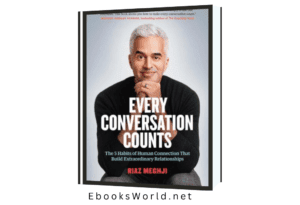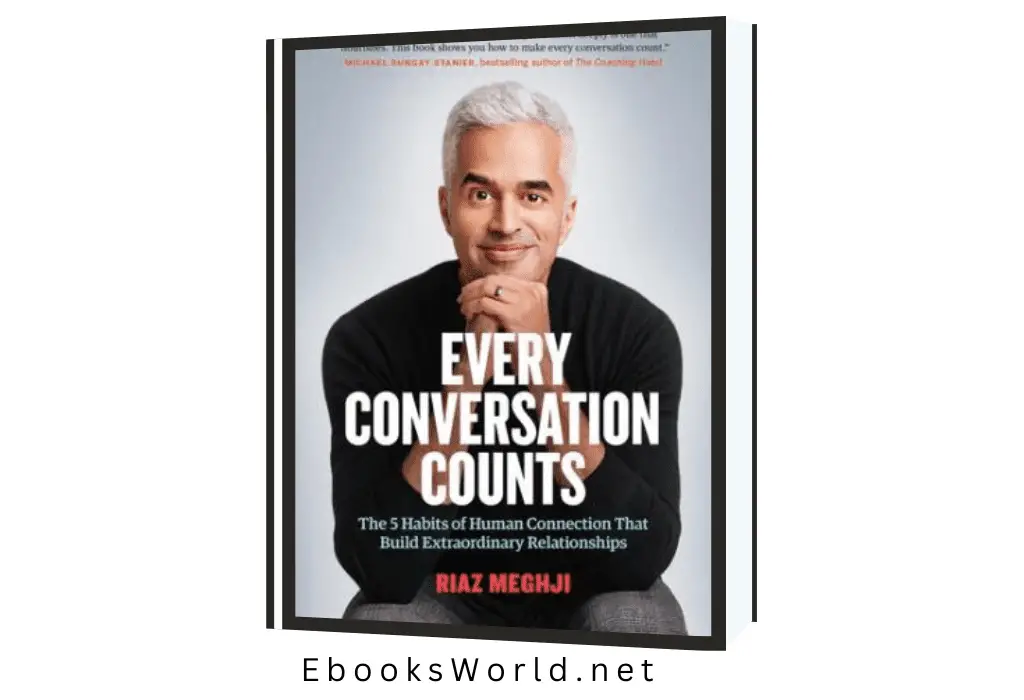Every Conversation Counts: The 5 Habits of Human Connection That Build Extraordinary Relationships

Ratings
“Every Conversation Counts: The 5 Habits of Human Connection That Build Extraordinary Relationships” by Riaz Meghji is a guide to enhancing the quality of our relationships through effective communication. Meghji, a seasoned television host and keynote speaker, draws on his experiences and research to present five key habits that can transform ordinary conversations into extraordinary connections.
1. Be Present: The first habit emphasizes the importance of being fully present in conversations. Meghji argues that in our fast-paced, technology-driven world, genuine connection often takes a back seat. Being present involves actively listening, putting away distractions, and focusing on the person in front of you. The author suggests that practicing mindfulness can significantly enhance our ability to be present in conversations. By fully engaging with others without the constant intrusion of external distractions, we create a space for meaningful connection to thrive.
2. Speak with Intent: The second habit encourages individuals to speak with purpose and intention. Meghji emphasizes the significance of thoughtful communication, where words are chosen carefully to convey the intended message. The author encourages readers to be mindful of the impact their words can have on others and to express themselves with empathy. By doing so, individuals can foster an environment of trust and understanding. This habit is not just about what is said but also how it is said, emphasizing the importance of tone, body language, and overall communication style.
3. Ask Better Questions: The third habit focuses on the art of asking meaningful questions. Meghji suggests that asking open-ended questions fosters deeper connections by encouraging others to share more about themselves. The author emphasizes the need to move beyond surface-level inquiries and to explore the thoughts, feelings, and motivations of those we engage with. By asking better questions, individuals can demonstrate genuine interest in others and create an atmosphere where meaningful conversations can flourish.
4. Ditch the Agenda: The fourth habit challenges the notion of approaching conversations with a predetermined agenda. Meghji argues that being too focused on one’s own agenda can hinder the natural flow of a conversation and limit the potential for genuine connection. Instead, the author advocates for a more flexible and open approach to conversations. By letting go of preconceived notions and being adaptable in our interactions, we can create a space for authentic and unexpected connections to emerge.
5. Reflect Before You Respond: The fifth and final habit encourages individuals to take a moment to reflect before responding in a conversation. Meghji suggests that this pause allows individuals to respond more thoughtfully, leading to more constructive and meaningful interactions. By avoiding impulsive reactions, individuals can navigate conversations with greater emotional intelligence. This habit also promotes self-awareness, as individuals learn to understand their own emotions and reactions in different situations.
In this summary, “Every Conversation Counts” provides a practical framework for building extraordinary relationships through intentional communication. By incorporating the five habits—being present, speaking with intent, asking better questions, ditching the agenda, and reflecting before responding—readers can transform their interactions with others. Meghji’s insights are not only applicable in personal relationships but also extend to professional settings, making this book a valuable resource for anyone seeking to improve the quality of their connections.
Ultimately, the book serves as a reminder that every conversation is an opportunity to build a meaningful connection, and by adopting these habits, individuals can turn ordinary conversations into extraordinary relationships.







